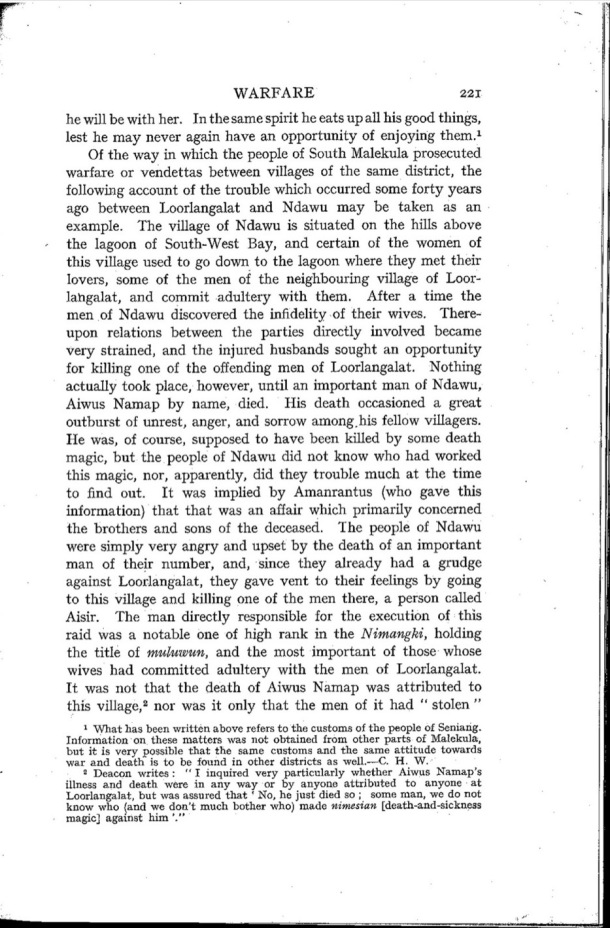|
|  [Note: this transcription was produced by an automatic OCR engine]
E’ .
WARFA RE 22:
he will be with her. In thesaine spirit he eats up all his good things,
lest he may never again have an opportunity of enjoying them,‘
Of the way i.n which the people of South Malekula prosecuted
warfare or vendettas between villages of the same district, the
following account of the trouble which occurred some forty years
ago between Loorlangalat and Ndawu may be taken as an
example. The village of Ndawu is situated on the hills above
the lagoon of South~West Bay, and certain of the women of
this village used to go downy to the lagoon where they met their
lovers, some of the men of the neighbouring village of Leor-
lahgalat, and commit adultery with them. After a time the
men of Ndawu discovered the inï¬Ådelity of their wives. There-
upon relations between the parties directly involved became
very strained, and the injured husbands sought an opportunity
for killing one of the offending men of Loorlangalat. Nothing
actually took place, however, until an important man of Ndawu,
Aiwus Narnap by name, died. His death occasioned a. great
outburst of unrest, anger, and SOITOW amonghis fellow villagers.
He was, of course, supposed to have been killed by some death
magic, but the people of Ndawu did not know who had worked
this magic, nor, apparently, did they trouble much at the time
to ï¬Ånd out. It was implied by Amanrantus (who gave this
information) that that was an affair which primarily concerned
the brothers and sons of the deceased. The people of Ndawu
were simply very angry and upset by the death of an important
man of their number, and, sinoe they already had a grudge
against Loorlangalat, they gave vent to their feelings by going
to this village and killing one of the men there, a person called
Aisir. The man directly responsible for the execution of this
raid was a notable one of high rank in the Nimomgki, holding
the title of muhmnm, and the most important of those whose
wives had committed adultery with the men of Loorlangalat.
It was not that the death of Aiwus Namap was attributed to
this village,’ nor was it only that the men of it had “stolenâ€ù
I What has been written above refers to the customs of the people of Seniang.
Information on these matters was not obtained from other parts oi Meldruln,
but it is very possible that the same Customs and the same attitude towards
war and death is to be found in other districts as well.-—C. i-i. w.
I Deacon writes: " I inquired very particularly whether Aiwus Nam-1p's
illness and deeth were in any way or by anyone attributed to anyone at
Loorleugalat, but was aaured that ‘ No, he just died !O; some man, we do not
know who (and we don't i:n|Lh bother who) mode nmiesinn [deat.h»and~eickne.!s
magic] against him
|